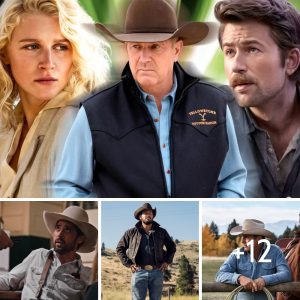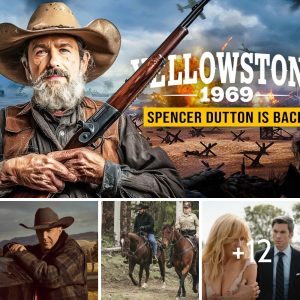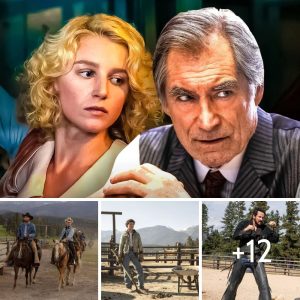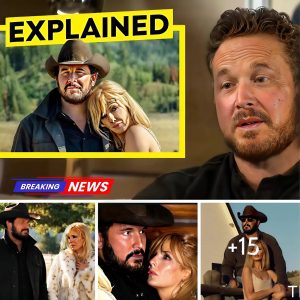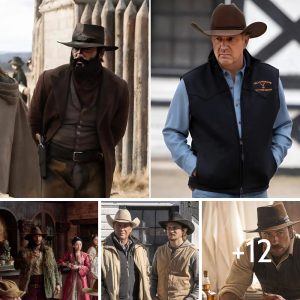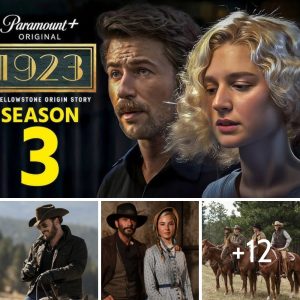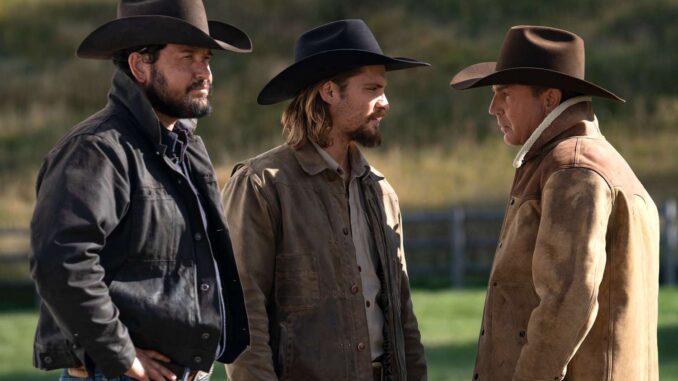
The Branding Iron of the West: Yellowstone Cast Transformations Before and After Joining the Series
In the rugged, sprawling canvas of the American West, where loyalty is forged in fire and ambition carves its own destiny, Yellowstone has become more than just a television series; it’s a cultural phenomenon. Yet, beyond the sweeping landscapes and the high-stakes drama of the Dutton empire, lies another compelling narrative: the profound transformations undergone by its principal cast. These aren’t just shifts in costume or dialogue; they are often seismic alterations in public perception, career trajectory, and the very essence of the archetypes they embody. Before the branding iron of the Dutton Ranch seared their identities onto the collective consciousness, many of these actors inhabited different skins. Their journey onto Yellowstone has been, for some, a redefinition, and for others, a raw unleashing of previously untapped power.
Perhaps no one exemplifies this redefinition more acutely than Kevin Costner as John Dutton. Before Yellowstone, Costner was already an American icon, synonymous with cinematic heroism, often gracing the screen as the stoic everyman, the baseball legend, or the lone wolf of the plains. From the idealistic, dancing soldier of Dances with Wolves to the romantic catcher in Bull Durham, his image was built on a foundation of integrity, a somewhat gentle strength, and an unmistakable leading-man charisma. He was the hero you rooted for without question. Enter John Dutton: gruff, guarded, deeply flawed, and clinging to his land with a tenacity that often borders on ruthlessness. Costner, with his weathered visage and gravelly voice, strips away any vestiges of easy heroism. He embraces the morally ambiguous patriarch, a man burdened by tradition and stained by the choices necessary to preserve his legacy. The transformation isn’t about becoming a star, but about a legendary star willing to tarnish his own polished image, to delve into the complex, often unlikable depths of a man who is both villain and victim, saint and sinner. Costner’s John Dutton is not merely a role; it is a profound reimagining of the Western archetype through the lens of a living legend.
Equally striking, though perhaps from a different starting point, is the metamorphosis of Kelly Reilly into Beth Dutton. Prior to her fiery embodiment of the Dutton daughter, Reilly had a respectable and varied career, often portraying characters of quiet elegance, vulnerability, or sharp intellect. One might recall her as the graceful wife of Dr. Watson in the Sherlock Holmes films, the conflicted pilot in Flight, or the troubled detective in True Detective. Her performances, while compelling, rarely hinted at the raw, unbridled ferocity that Beth Dutton commands. Beth is a human wildfire: sharp-tongued, brilliantly strategic, deeply wounded, and loyal to a fault that veers into the pathological. She is a woman who uses her words like weapons and her fury as a shield. Reilly’s transformation is less about refining an existing persona and more about unleashing a primal force. She sheds the subtle nuances of her previous roles for a character who operates at an eleven, all the time. Audiences now see Kelly Reilly and immediately think of Beth Dutton’s scathing wit, her audacious fashion, and her capacity for both profound love and terrifying vengeance. It’s a complete and utterly captivating reclamation of her on-screen identity.
Then there’s Cole Hauser, whose portrayal of Rip Wheeler has elevated him from a reliable character actor to an undisputed heartthrob and cultural icon. For years, Hauser was “that guy” in a variety of films: the earnest student in Higher Learning, the troubled friend in Good Will Hunting, the menacing villain in Pitch Black, the action hero in Tears of the Sun. He was versatile, capable, often bringing a quiet intensity to his roles, but rarely was he the central focus, or the one everyone was talking about. As Rip Wheeler, Hauser has tapped into a vein of stoic masculinity and unwavering loyalty that resonates deeply with audiences. He embodies the quiet strength of the ranch hand, the protector, the man of few words but profound actions. His transformation isn’t just physical—though the beard and cowboy hat certainly complete the look—it’s an embodiment of a specific, aspirational archetype. He has become the ideal of rugged, dependable masculinity, a stark contrast to many of his more volatile or less defined previous characters. Rip Wheeler is a distillation of an ideal, and Cole Hauser has become inseparable from it, proving that sometimes, the supporting character can steal the entire show and forge a new legend.
Finally, the complex and tragic journey of Wes Bentley as Jamie Dutton offers a different lens on transformation. Bentley, who famously burst onto the scene with American Beauty, often played roles imbued with a quiet intensity, a brooding melancholy, or a hidden vulnerability. From the mysterious, rose-petal-obsessed Ricky Fitts to the haunted survivor in The Hunger Games, his characters frequently carried a sense of internal conflict or alienation. As Jamie Dutton, Bentley plunges even deeper into the abyss of a character defined by his torment. Jamie is perpetually striving for approval, constantly manipulated, and forever caught in the shadow of the family he longs to belong to but can never truly escape. Bentley’s transformation isn’t about a sudden shift in type, but an unparalleled excavation of a character’s psychological unraveling. He takes the seeds of vulnerability and quiet desperation from his earlier roles and cultivates a character whose very existence is a testament to unrequited love and self-loathing. His Jamie is a masterclass in portraying sustained anguish, a man broken not by external forces alone, but by his own crippling insecurities and the relentless weight of the Dutton name.The Yellowstone cast, therefore, represents more than just a collection of talented actors inhabiting roles. They embody a collective transformation, a testament to the power of a compelling narrative to reshape careers, redefine public personas, and unleash previously unseen facets of performance. From Costner’s reimagined legend to Reilly’s unleashed fire, Hauser’s stoic rise, and Bentley’s profound anguish, each actor has been branded by the essence of the Dutton Ranch, emerging not just as actors who played iconic characters, but as figures forever entwined with the rugged, untamed spirit of Yellowstone. Their before-and-after stories are as compelling as the show itself, illustrating how art can not only imitate life but fundamentally alter it.
